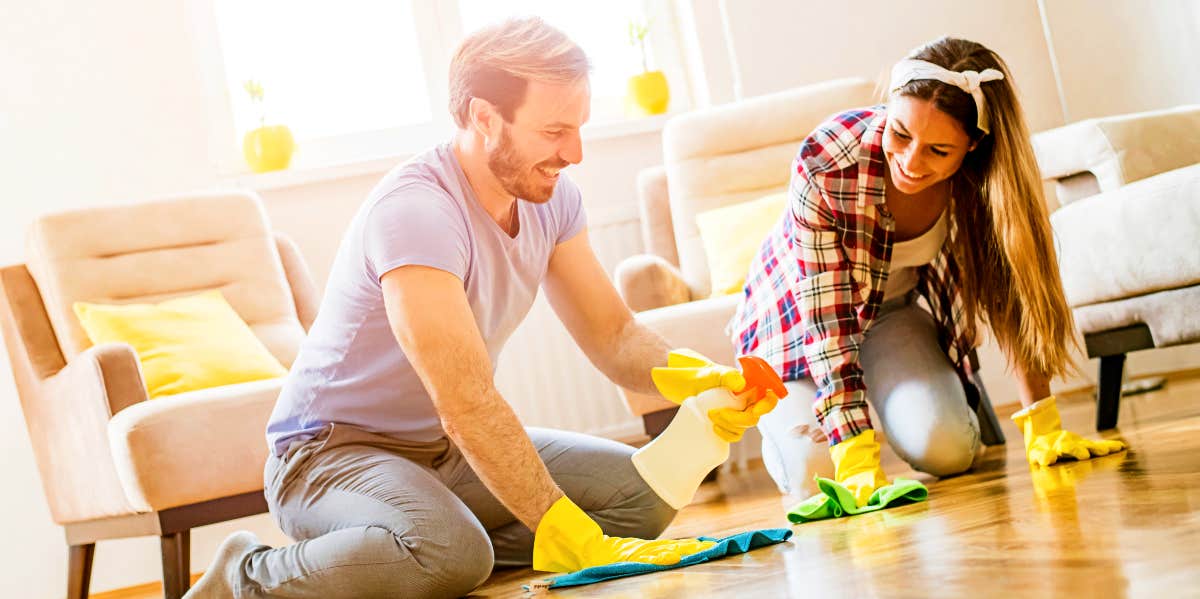How To Thrive In A Relationship With Someone Who Needs Everything Organized (& You Don't)
Bless this mess? Um ... not exactly.
 Drpixel / Shutterstock.com
Drpixel / Shutterstock.com Do you feel you have been judged because someone called you a “neat freak” or a “slob?"
A neat freak and slob exist at polar ends of a spectrum. Most of us occupy an area somewhere in between these opposites. There will always be someone neater than you — or a bigger slob.
The question is, how do people who exhibit such different personalities and personal habits coexist?
By most standards, I was a tidy person, but then, when my kids came along, it was a losing battle. I said to myself “I prefer peace over neatness. When my children leave home I will organize my house to my heart’s content.”
And, for over thirty years, I veer to the disorganized side of the spectrum. Which is not necessarily a bad thing!
What does it mean when things are disorganized?
I thrive on organized chaos. In my heaps, I know what exists where and can very easily find it.
And then consider the Pareto principle, which is commonly referred to as the 80/20 rule. This means that 20 percent of the population leans toward thriving in self-created, organized chaos. Implying forty percent of the population are slobs and the other forty, neat-freak.
Also, in the world of neat freaks, if you are not a neat freak then you must be a slob. Being a neat freak may be one of the symptoms of having OCD (obsessive-compulsive disorder).
But there’s more to having OCD than being a person who gets upset when things are not just as they want it facing a certain direction.
If you are an organized person doesn’t mean you have OCD. But those with OCD definitely like things their way and if it isn’t then hell breaks loose first within them and soon spills over engulfing whoever happens to be around.
It’s not a pretty sight, and the only solution to help yourself and the one struggling with their OCD-like behavior is compassion. But before you express compassion for someone else you need to have compassion for yourself.
How to help someone acting out when things are disorganized
The most efficient and effective way of practicing compassion is through the art of self-compassion. You have to first find it in you, then expand it all within and around you, and finally share it with others.
You might apologize for your “mess," but an apology might mean to the organized one that you are wrong and they are right. Because you are the bigger person and willing to be vulnerable when you apologize you "prove" that you are wrong.
Now, if you don’t apologize that would mean you are a slob, and arrogant — according to how some might interpret it. And that’s far from the truth. So what are your options?
If some are challenged by neatness, others may be challenged by mess.
It is an equal challenge on both ends. So, how do the wise navigate through this challenge and keep their balance? Live in compassion and save yourself the vitriol.
How to handle OCD-like behavior when it comes to neatness
When someone is upset with you over your “mess," you could play the victim card, let them be right, apologize and stay or move on. This will not make it better for them or you.
Here’s what you could do instead. Learn and understand why some people are neat freaks or obsessive-compulsive about things being a certain way. They are visual people and everything is about how things appear to them. Only those who are visually dominant can get so extreme when things are not placed a certain way.
They are triggered not just by when someone touches their stuff. They will come to your table and room and start organizing uninvited.
Their brain functions like a librarian. There’s a method to everything within them and if it is not they get viscerally upset. They’ll find it hard to be “nice” to you when things are not tidy around you.
Boundaries matter
Create boundaries and be specific about them. If you know your things in the common area upset them, keep your things only in your space. Tell them with as much love as possible that just like you don’t touch their things, you’d love it if they don’t touch yours.
And who doesn’t love a tidy place? Everyone does, even those who are not primarily visual. So leave the common area to their rule, but with gentle firmness let them know you like your place your way and your things where you leave them.
You take responsibility for your things and when you can’t find something don’t ask them if they have seen it. This will make them right and you just lost your territory.
As a human, you are a creature of habit. So start a habit of keeping your things in your space, your way, and repeat it for twenty-one days and you will never have to worry about where what is and ask anyone for directions.
Last but not the least, don’t touch anything that’s not yours unless you are directed to or without permission. Life just got a bit smoother living with your organized family member.
Keya Murthy, M.S., works as a Clinical Hypnotherapist, Spiritual Life Coach, and Energy Medicine Practitioner at the Ventura Healing Center. She’s a #1 International Best-selling Author on Amazon and her latest book is The Book On Happiness: How to have Peace and Stability as a Working Mom

